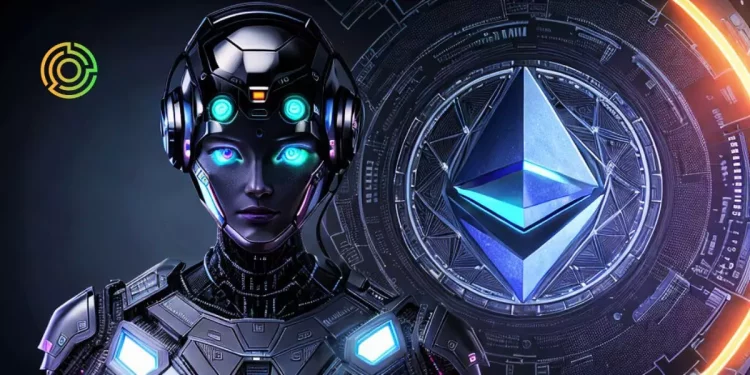Well-known YouTube analyst Altcoin Daily highlighted that ethereum (ETH), Optimism (OPI) and Polygon (MATIC) are among the main cryptocurrencies that will be fundamental in the field of artificial intelligence (AI).
According to the expert, the programmability of the Ethereum network positions it as a strong competitor in the AI industry, with several promising options emerging in the Ethereum ecosystem, such as Optimism (OP) and Polygon (MATIC).
Altcoin Daily noted that Optimism, a technology used by Coinbase’s Ethereum 2 network, aims to improve scalability and provide unified liquidity across ETH scale networks.
In addition, while noting that Polygon was initially conceived as a sidechain, he showed that this network grew to become a formidable player in the layer two space.
These cryptocurrencies are vital for AI.
Altcoin Daily noted that the Avalanche blockchain (AVAX) should be considered to have a significant impact in the artificial intelligence space as an ideal base layer network.
He stated that such a blockchain had attracted major companies such as Alibaba, which is building a metaverse launch pad and exploring other companies on the Avalanche blockchain.
The analyst also highlighted Cardano (ADA), Solana (SOL), Litecoin (LTC) and Fantom (FTM) as AI contenders.
Altcoin Daily revealed that Fantom’s development team takes an evidence-based approach to address blockchain bottlenecks, L2 solutions and fragmentation.
The FTM blockchain is compatible with ethereum because of its low completion time, low transaction costs and high scalability.
The analyst highlighted that Fantom would be at the forefront of the AI revolution by improving the scalability, power consumption, security, complexity and interoperability of blockchain technology.
Arthur Hayes and his prediction of AI and bitcoin (BTC).
In his video, the analyst addressed the opinion of former BitMEX CEO Arthur Hayes, who claimed that bitcoin (BTC) would be the go-to currency for AI.
According to Hayes, artificial intelligence requires a digital, automated and censorship-resistant payment infrastructure, which traditional banking and fiat currencies cannot offer.
Conclusion
Analysts predict that the role of Ethereum and altcoins in artificial intelligence (AI) technologies will be fundamental. These digital assets offer a decentralized platform that facilitates secure and efficient transactions, smart contracts, and decentralized applications (DApps).
With the increasing demand for AI solutions and the necessity for transparent and secure data management, Ethereum and altcoins present a promising foundation for the advancement of AI applications.
As the relationship between blockchain technology and AI evolves, Ethereum and altcoins are expected to become essential components within the AI ecosystem. They will drive innovation and transformation across a wide range of industries.
FAQs
What is Ethereum?
Ethereum is a decentralized blockchain platform designed to enable the creation and execution of smart contracts and decentralized applications (DApps). It serves as a more versatile and programmable alternative to Bitcoin, empowering developers to build and deploy their own blockchain-based applications.
What are altcoins?
Altcoins are cryptocurrencies other than Bitcoin. They are digital currencies developed based on Bitcoin’s principles and technology. Popular altcoins include Ethereum, Ripple, Litecoin, and others.
How can Ethereum and altcoins contribute to artificial intelligence?
Ethereum and altcoins provide a decentralized platform that supports the development and implementation of AI technologies. Their blockchain infrastructure ensures secure and transparent data management, which is critical for AI systems reliant on high-quality and dependable data.
Moreover, Ethereum’s smart contracts enable the automation of AI processes and transactions, promoting efficiency and cost reduction.
In what ways can Ethereum and altcoins drive AI innovation?
Ethereum and altcoins foster AI innovation by offering a decentralized and programmable infrastructure. Developers can leverage the advantages of blockchain technology, such as data immutability, transparency, and security, to create AI applications.
For example, Ethereum’s smart contracts facilitate the creation of decentralized AI marketplaces where data providers, AI developers, and users can interact and exchange services.
Which industries can benefit from the synergy between Ethereum, altcoins, and AI?
The synergy between Ethereum, altcoins, and AI holds potential for various industries. Healthcare, finance, supply chain management, cybersecurity, and autonomous vehicles are just a few examples.
In healthcare, Ethereum-based blockchain solutions can enhance medical data sharing and secure patient records, while AI algorithms can analyze the data for improved diagnostics and personalized treatments.
What challenges or limitations should be considered when integrating Ethereum and altcoins with AI?
Several challenges and limitations should be considered. Scalability is one challenge, as blockchain networks like Ethereum may face congestion and slower transaction times during periods of high demand.
Integrating AI with blockchain also requires careful consideration of data privacy and security, as the decentralized nature of blockchain can pose challenges in protecting sensitive information.
Follow us on our social networks and keep up to date with everything that happens in the Metaverse!
Twitter Linkedin Facebook Telegram Instagram Google News











































